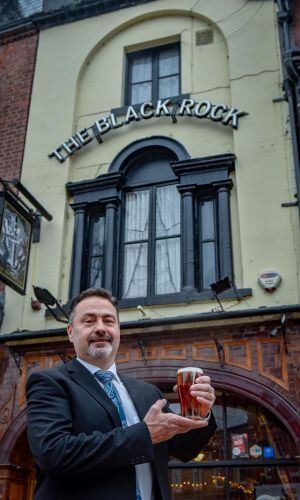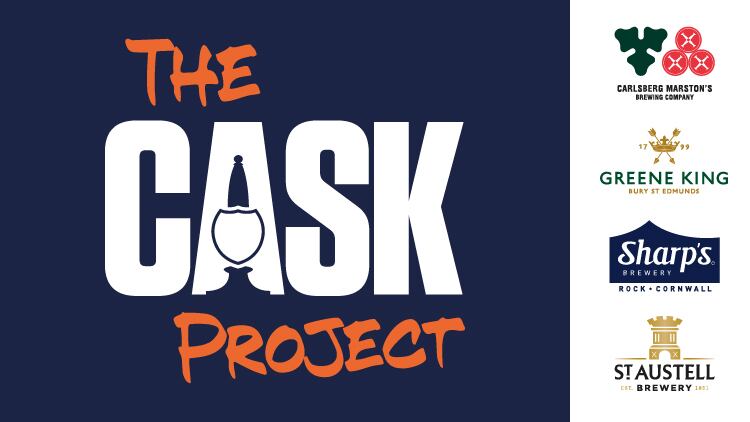
Question: Tell us a bit about you and your pub?
Shaun Slater: The Black Rock is one of Wakefield city centre’s last remaining traditional pubs. The pub is named after Yorkshire’s coal mining past. It’s grade II-listed and absolutely beautiful – lots of people take pictures in front of it.
It’s like stepping back in time inside; the décor is unchanged from the 1980s. We don’t serve food – except an extensive choice of crisps and snacks – and there’s no loud music. It’s an old-fashioned local: welcoming, friendly and all about great beer – especially cask ale – and good chat.
Cask ale is the bedrock of our business, accounting for 70% of sales. We stock six cask ales and have won many awards for it, we’re currently CAMRA’s Wakefield District pub of the year.
My mum was the pub’s cleaner and I started out stocking shelves here when I was 14 to earn a bit of pin money. I fell in love with the pub then and I’ve been working here on and off for more than 40 years, finally taking over as licensee in 1998.
I’m passionate about the Black Rock and its reputation as well as cask ale. There’s a skill involved in looking after cask ale. I love the whole process of nurturing it and ensuring it’s ready. Running the Black Rock is my dream job – there’s nowhere else I’d rather be.
Q. What’s your favourite cask ale and why?
SS: At the moment, it’s Theakston Summit. We have it on permanently but I particularly enjoy it during the summer months. It’s served at lager temperature so it’s very refreshing and, unlike many other beers, it keeps its head and doesn’t go hazy in the warmer weather. Sales of it really pick up on hot days.
Q: What’s been your proudest achievement as a publican?
SS: The Black Rock has won many awards over the years. It’s always fantastic to get that endorsement and gives the staff and regulars a real boost. Winning Star Pubs & Bars’ Cask Ale Pub of the Year was my proudest moment though because they’ve got 2,400 pubs nationwide and there was so much competition.
Q: How do you see the cask ale market evolving over the next five years – what do you think will be the next big trends?
SS: The market needs to innovate in order to broaden its appeal and attract the younger drinkers that will sustain it long term.
I hope the market will follow the spirits sector and introduce more flavoured products. At the moment, these tend to be seasonal ‘one-offs’. They always go down extremely well. There’s an opportunity to expand this category and produce more flavoured ales brewed in casks imbued with spirits such as whisky, sherry, rum and Tequila.
Alcopops are out and flavoured gins have peaked so there’s a gap in the market for sweeter alcoholic drinks. I think fruit cask ales are poised to take off. It’ll be good for the cask ale market if they do, as their sweetness will appeal to a younger demographic as well as women and attract new cask drinkers.
Q: What do you think cask ale needs to do to introduce younger customers to the category and bring in more female consumers?
SS: Although we get plenty of groups of young men – and increasingly women – drinking cask ale at the Black Rock, cask ale still has a bit of an image problem, tending to be perceived as a drink for older people. To counteract this, cask ale needs to be marketed via social media. Imagery should show mixed groups of young people enjoying drinking cask ale.
Cask ale serves need updating. Bottles are particularly popular with young people and cask ale should be advertised in bottles to make it more relevant. Introducing more elegant, interesting glassware in half pints would also entice new drinkers. You could tap into the younger market by running events with university involvement and promote cask ale in bottles to restaurants along with food pairing suggestions – cask ale is easy to drink and less gassy than lager, it’s the perfect accompaniment to a good meal.
Q: What will you be doing in your pub to entice new consumers into the category?
SS: We’re constantly striving to attract new drinkers. We never rest on our laurels and always strive to deliver ‘the best’ for our customers, both in terms of our cask ales and the pub experience. It keeps the Black Rock thriving and I’m sure is the reason the pub is busier than ever despite the pandemic and the cost-of-living crisis. Taking that approach generates ‘word-of-mouth’ recommendations, which is the most effective form of advertising. It’s the main way we get new customers and has resulted in three generations of some families remaining loyal to the Black Rock and becoming cask ale drinkers.
Using social media to engage with regulars and potential customers, finding out what they’d like us to stock and getting in those ales whenever possible.
Sustainability and local sourcing are two massive consumer trends. We’ll continue to stock local cask ales through our relationship with the Society of Independent Brewers (SIBA). There are lots of fantastic brewers in the Wakefield, Sheffield, Leeds and Barnsley areas, and people love it when we offer their ales. It’s a great talking point and gets the pub tagged into lots of posts on social media.
Ensuring the fundamentals are right:
- Stocking a good range and keeping it interesting. We have three permanent cask ales and three that are constantly changing
- Looking after the product and keeping it in perfect condition
- Having a well-trained team that cares about cask, can educate and enthuse customers about the ales we stock and take pride in serving the perfect pint
- Offering ‘try before you buy’. If you describe the beer well enough, customers shouldn’t need it but it can give people the confidence to experiment and branch out so it is well worth doing.
We always promote what we offer. We use every form of communication from chalkboards advertising new products to the real ale app finder, which introduces new people to the pub.
Retaining our Cask Marque accreditation gives the Black Rock’s cask ales credibility and brings in new customers on ale trails.
We find fresh ways of linking up with the local university and other groups of younger people. For example, we’re participating in an art walk, displaying the work of an up-and-coming young artist.
Authenticity and unique experiences are very important to consumers right now. The Black Rock is one of the last remaining traditional pubs in Wakefield city centre. People are increasingly seeking it out because it’s traditional and offers something different to other pubs. They like the fact there’s no loud music and it’s all about good beer and good chat. So, while we’ll keep the pub looking great, we’ve no plans to modernise and it will continue to be a totally unspoilt ‘proper pub’.
Q: What’s the most common mistake you see out in pubs when it comes to selling cask ale?
SS: Only stocking readily available cask ales from big brewers – it means you’ve got no point of difference. You need a balance of recognised, mainstream ales and harder to find beers brewed by smaller independents.
Also, serving the product incorrectly by pulling it flat is another mistake.
Q: What would be your top three tips for running an amazing cask ale offer?
SS: Having the right variety and choice of products. That means finding out what your customers want, not just putting the beers you like on the bar, and stocking ales brewed by a balance of well-known brewers and smaller, local producers.
Ensuring your product is served in tip-top condition and gaining endorsement for its quality via Cask Marque accreditation.
Employing cask enthusiasts as staff, training them well and getting them to share their knowledge and passion with customers.
If you’re doing all of the above brilliantly, promoting your cask ale is an essential fourth top tip.
What would you recommend publicans do to make the most of this year’s Cask Ale Week?
My top tip is to refresh your beer board with some new local beers, and then publicise it through all forms of communication from chalkboards to social media.




